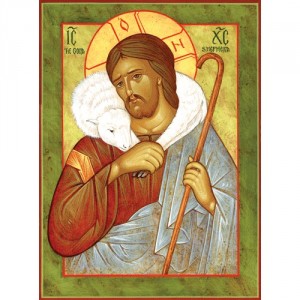 To understand this parable we must consider who the sheep are, namely, that they are the faithful of Christ and those in the grace of God: “We are the people of his pasture, and the sheep of his hand” (Ps 95:7); “You, the people, are the sheep of my pasture” [Ez 34:31]. And so the sheepfold is the multitude of the faithful: “I will surely gather all of you, O Jacob, I will gather the remnant of Israel; I will set them together like sheep in a fold” (Mic 2:12). The door of the sheepfold is explained in different ways by Chrysostom and by Augustine.
To understand this parable we must consider who the sheep are, namely, that they are the faithful of Christ and those in the grace of God: “We are the people of his pasture, and the sheep of his hand” (Ps 95:7); “You, the people, are the sheep of my pasture” [Ez 34:31]. And so the sheepfold is the multitude of the faithful: “I will surely gather all of you, O Jacob, I will gather the remnant of Israel; I will set them together like sheep in a fold” (Mic 2:12). The door of the sheepfold is explained in different ways by Chrysostom and by Augustine.
According to Chrysostom, Christ calls Sacred Scripture the door, according to “Pray for us also that God may open to us a door for the word” (Col 4:3). Sacred Scripture is called a door, as Chrysostom says, first of all, because through it we have access to the knowledge of God: “which he promised beforehand through his prophets in the holy scriptures” (Rom 1:2). Secondly, for just as the door guards the sheep, so Sacred Scripture preserves the life of the faithful: “You search the scriptures, because you think that in them you have eternal life” (5:39). Thirdly, because the door keeps the wolf from entering; so Sacred Scripture keeps heretics from harming the faithful: “Every scripture inspired by God is also profitable for teaching, for reproof, for correction” (2 Tim 3:16). So, the one who does not enter by the door is the one who does not enter by Sacred Scripture to teach the people. Our Lord says of such: “In vain do they worship me, teaching as doctrines the precepts of men” (Matt 15:9); “You have made void the word of God” (Matt 15:6). This, then, is the mark of the thief: he does not enter by the door, but in some other way.
Against this interpretation is the fact that when our Lord explains this further on, he says, I am the door. So it seems that we should understand the door to be Christ. In answer to this, Chrysostom says that in this parable our Lord refers to himself both as the door and the shepherd; but this is from different points of view, because a door and a shepherd are different.
According to Augustine, the door is Christ, because one enters through him: “After this I looked, and lo, in heaven an open door!” (Rev 4:1). Therefore, anyone who enters the sheepfold should enter by the door, that is, by Christ, and not by another way.
Note that both the sheep and their shepherd enter into the sheepfold: the sheep in order to be secure there, and the shepherd in order to guard the sheep. And so, if you wish to enter as a sheep to be kept safe there, or as a shepherd to keep the people safe, you must enter the sheepfold through Christ. You must not enter by any other way, as did the philosophers who treated the principle virtues, and the Pharisees who established the ceremonial traditions.
It should be noted that just as one who does not enter by the door as a sheep cannot be kept safe, so one who enters as a shepherd cannot guard the sheep unless he enters by the door, namely, by Christ. This is the door through which the true shepherds have entered: “And one does not take the honor upon himself, but he is called by God, just as Aaron was” (Heb 5:4). Evil shepherds do not enter by the door, but by ambition and secular power and simony; and these are thieves and robbers: “They set up princes, but without my knowledge,” that is, without my approval (Hos 8:5). Further, he says such a person climbs in by another way, because the door, namely, Christ, since it is small through humility – “Learn from me; for I am gentle and lowly in heart” (Matt 11:29) – can be entered only by those who imitate the humility of Christ. Therefore, those who do not enter by the door but climb in by another way are the proud. They do not imitate him who, although he was God, became man; and they do not recognize his lowering of himself.
Now he considers the shepherd. First, he mentions the mark of the shepherd; secondly, he shows through signs that he is the shepherd (v 3).
The mark of the true shepherd is to enter by the door, that is, by the testimony of Sacred Scripture. Thus Christ said: “Everything written about me in the Law of Moses and the prophets and the psalms must be fulfilled” (Lk 24:44). He is called a shepherd: “I am not troubled when I follow you as my shepherd” [Jer 17:16]; “He rebukes and trains and teaches them, and turns them back, as a shepherd his flock” (Sir 18:13).
Now he mentions the signs of a good shepherd; and there are three. The first relates to the gatekeeper, and is that the good shepherd is let in by him. As to this he says, to him the gatekeeper opens. This gatekeeper, according to Chrysostom, is the one who opens the way to a knowledge of Sacred Scripture. The first one to do this was Moses, who first received and established Sacred Scripture. And Moses opened to Christ, because as was said above: “If you believed Moses, you would believe me, for he wrote of me” (5:46).
The second sign relates to the sheep, and it is that they obey the shepherd. This is what he says, the sheep hear his voice. This is reasonable if the resemblance to a natural shepherd is considered: because just as sheep recognize the voice of their shepherd due to familiar experience, so righteous believers hear the voice of Christ: “O that today you would harken to his voice” (Ps 95:7).
The third sign is taken from the actions of the shepherd. Here he mentions four actions of a good shepherd: the first being that he knows his sheep. He says, he calls his own sheep by name, which shows his knowledge of and familiarity with his sheep, for we call by name those whom we know familiarly: “I know you by name” (Ex 33:17). This is part of the office of a shepherd according to: “Be diligent to know the countenance of your flock” [Prv 27:23]. This applies to Christ according to his present knowledge, but even more so considering eternal predestination, by which he knew them by name from eternity: “He determined the number of the stars, he gives to all of them their names” (Ps 147:4); “The Lord knows those who are his” (2 Tim 2:19).
The second action of a good shepherd is that he leads them out, i.e., he separates them from the society of those who are evil: “He brought them out of darkness and gloom” (Ps 107:14).
The third is that having separated them from evil and having brought them into the sheepfold, he has brought out all his own, from the sheepfold. He does this, first, for the salvation of others: “I will send survivors to the nations” (Is 66:19); “Behold, I send you as sheep in the midst of wolves” (Matt 10:16), so that they can make sheep out of the wolves. Secondly, they are to show the direction and way to eternal life: “To guide our feet into the way of peace” (Lk 1:79).
Fourthly, the good shepherd goes before his sleep by the example of a good life; so he says, he goes before them, although this is not what the literal shepherd does, for he follows, as in “I took him from following the ewes” [Ps 78:70]. But the good shepherd goes before them by example, “not as domineering over those in your charge but being examples to the flock” (1 Pet 5:3). And Christ does go before them: for he was the first to die for the teaching of the truth – “If any man would come after me, let him deny himself and take up his cross and follow me” (Matt 16:24); and he went before all into everlasting life – “He who opens the breach will go up before them” (Mic 2:13).
From St Thomas Aquinas’ Commentary on the Gospel of St John (abridged)
